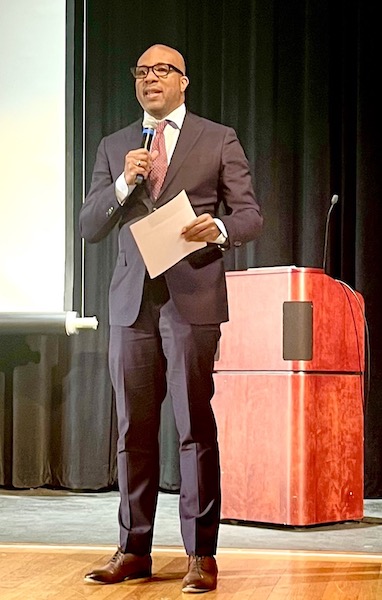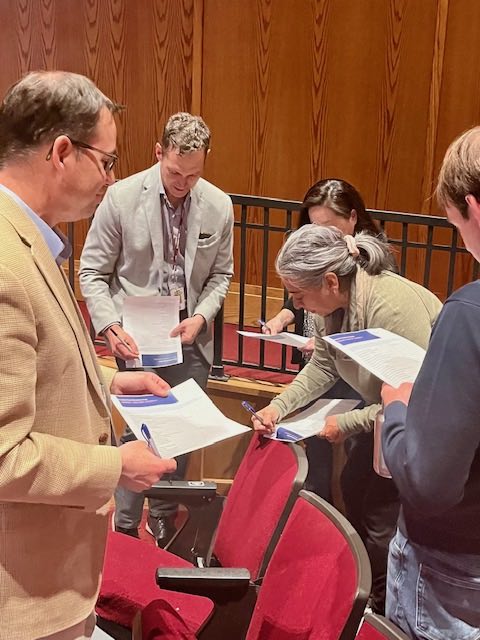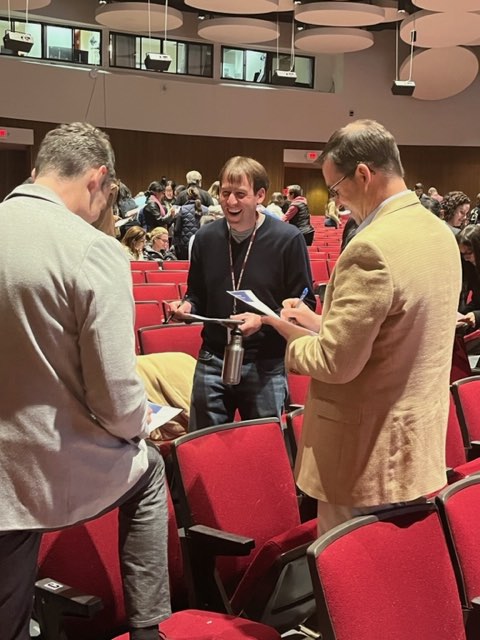Why An Understanding Of DEI Is Critical for Student Success
- Category: Schools
- Published: Tuesday, 02 May 2023 21:22
- Wendy MacMillan
 Dr. Derrick Gay led a workshop for the school community on April 25.What does “diversity” mean in our community and how can focusing on diversity and inclusion, help Scarsdale students be better prepared for life after graduation? These are only a few of the questions that Dr. Derrick Gay explored in his thought-provoking and engaging workshop on Tuesday April 25th. The program, hosted by our District’s PTC Diversity Equity and Inclusion Committee, aimed to help parents better understand how our District’s partnership with DEI expert and consultant Dr. Gay is crucial to the success of our students.
Dr. Derrick Gay led a workshop for the school community on April 25.What does “diversity” mean in our community and how can focusing on diversity and inclusion, help Scarsdale students be better prepared for life after graduation? These are only a few of the questions that Dr. Derrick Gay explored in his thought-provoking and engaging workshop on Tuesday April 25th. The program, hosted by our District’s PTC Diversity Equity and Inclusion Committee, aimed to help parents better understand how our District’s partnership with DEI expert and consultant Dr. Gay is crucial to the success of our students.
As the PTC DEI co-chairs outlined, “Students are currently navigating a cosmopolitan world composed of individuals from different backgrounds, viewpoints, and experiences. Research finds that intercultural competency-- the ability to communicate and connect with people from different backgrounds with respect and empathy—is critical for success in a globally connected world. Moreover, there are strong correlations between student perception of belonging and maximizing academic attainment.”
While Dr. Gay has worked with our administrators, faculty, and small focus groups since we first began our partnership with him in the 2021-22 school year, this was the first time the larger PTA community was given an opportunity to learn and hear from him firsthand. To begin the workshop, Dr. Gay used his professionalism and humor to connect with the audience and to highlight why language and communication is so important. He also outlined norms for respecting diversity of thought and experience, including:
Be present
Engage in active listening
Speak from the “I” perspective
Accept the speaker’s viewpoint as true for that person
Listen to understand vs. listen to respond
With these norms in mind, Dr. Gay then led the audience in an exercise asking them to consider, “What are your goals for your child’s education?”. Unsurprisingly, many parents want the same things for their children: to be an independent/critical thinker, to love learning and be a life-long learner, to know how to self-advocate, and to find what passions they want to pursue. Dr. Gay made note of the fact that all of these answers go far beyond just wanting our children to be good at math and science and demonstrates the importance of making room for social and emotional learning.
Dr. Gay then related that over one thousand CEOs were asked, “Which qualities will graduates need in the 21st century for success in college, careers, and citizenship?” At the top of the list were qualities that are at the center of DEI work. Qualities like:
-Analytical and Creative Problem Solving
-Complex Communication-Oral and Written
-Leadership and Teamwork
-Digital and Quantitative Literacy
-Adaptability, Initiative, and Risk-Taking
-Integrity and Ethical Decision Making
-Intercultural Competency/Global Perspective
He went on to help the audience reframe their definition of diversity by explaining that diversity goes far beyond constructs like race and socio-economic status, and made the point that in fact, we are all diverse…we all have varying backgrounds and identities that shape how we see and experience the world around us. He suggests that instead of focusing on who is different, we should focus on who has differences…which is everyone.
To drive this point home, Dr. Gay engaged the audience in an inspiring game of “bingo” where each person in the room was given a sheet of paper with statements like: I have been to all five NYC boroughs; I was born outside of New York; I have seen the movie Hidden Figures and so on. The goal was not only to find other people in the room who matched with one of the statements on the sheet…but to also take note of all the (not so obvious) ways we differ right in our own community. Dr. Gay stressed the importance of making all people, with their array of wonderful differences, feel welcomed, respected, and like they have a voice.
For further clarity Dr. Gay shared the definition of DEIB as it is defined by the National Association of Independent Schools:
-Diversity refers to the full range of human differences within overarching similarities.
-Equity means ensuring that everyone has equal access to the opportunities that will help them thrive.
-Inclusion refers to individual and institutional behaviors that show people they are accepted, respected, and valued.
-Belonging refers to the emotional and experiential outcome of inclusion.
So why should schools support DEIB efforts, as Dr. Gay outlines:
-Moral imperative: It is the right thing to do
-Aligned with goals of education: Development of the whole child
-Students deserve an inclusive learning environment
-Prepares students for thoughtful engagement in a multicultural and global society
-Correlation between positive sense of belonging and academic attainment: Students get better grades when they feel like they are seen and heard.
And if these reasons weren’t enough, Dr. Gay shared some of the many research and data resources which prove that diversity actually helps to make us smarter by encouraging us to think creatively and to remain more open minded.
 Towards the end of his workshop, Dr. Gay mentioned that too often parents are preparing their kids for the world they grew up in and not for the world their child is experiencing today. The landscape has shifted and younger students are more exposed to diversity of identity and background, and increasingly have questions. He encourages parents to:
Towards the end of his workshop, Dr. Gay mentioned that too often parents are preparing their kids for the world they grew up in and not for the world their child is experiencing today. The landscape has shifted and younger students are more exposed to diversity of identity and background, and increasingly have questions. He encourages parents to:
-Continue to educate yourself about these issues
-Continue to explore your own background and perspective, and how it influences how you understand and interact with others
-Model open communication with your children. They are talking about these issues amongst themselves.
-And remember, you don’t have to have all the answers! If you don’t know something, suggest you do a little research together.
Before opening the program to questions from the audience, Dr. Gay finished his workshop by sharing a quote from Maya Angelou:
“I’ve learned that people will forget what you said, people will forget what you did, but people will never forget how you made them feel.”
During the Q and A portion of the program, DEI Co-Chair Diksha Mudbhary Sitaula asked if Dr. Gay could describe some of the insights he has about our district after working with us for the past couple of years. Dr. Gay responded by highlighting some of the incredible attributes he has noticed including our District’s superb reputation. He also noted the District’s thoughtful approach to teaching the “whole child” and that he could clearly see the intent and care put forth to ensure that all students are learning. Among other things. Dr. Gay was also impressed with how the District searches out continued support around DEIB efforts but is not forcing the conversation to happen. Instead, he admires how the District is asking questions like, “How do we do this?” and “How can I do more?”.
As for some of the challenges, Dr. Gay related that since the Scarsdale School District isn’t “broken”, DEIB efforts might not feel as urgent…some in our community might not see the challenges and may not understand the need to do the work, but there is definitely work to be done. He noted for example, that some students in middle school take offense when friends joke about their accents, or cultural or physical differences. Many of these kids recognize that their friends are saying things “in jest”, but it still has a hurtful impact. He also spoke about the incidents where hate language was found in the bathroom at the high school and how some kids at SHS feel excluded because of their socio-economic status from joining things like band and choir trips. Dr. Gay assured the audience that these are global issues that require local solutions and he is encouraged by the work we are doing in our district.
These are only a few of the memorable moments of Dr. Gay’s workshop. For more about DEI in the Scarsdale School District please click here. And to learn more about Dr. Derrick Gay here.







